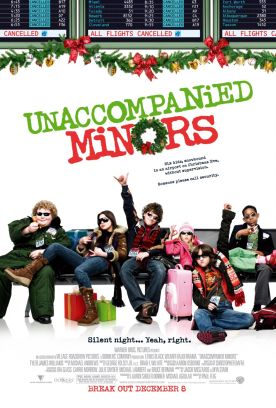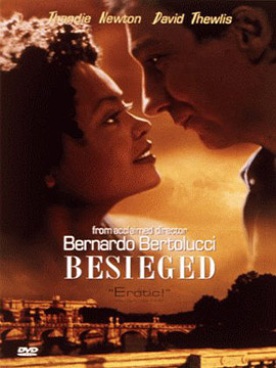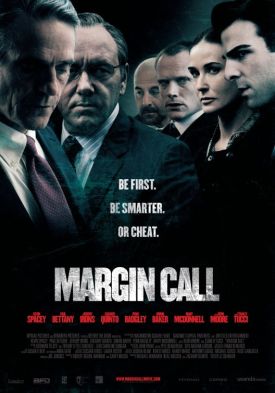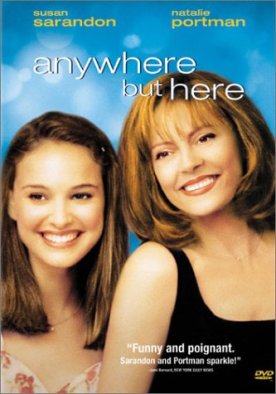Unaccompanied Minors
There has never been a time in Hollywood when movies have not been made without more or less careful calculation of their potential market, but the shamelessness with which the industry now allows marketing to dictate content surely surpasses anything we have seen before. The phenomenon is particularly evident in children’s movies like Unaccompanied Minors, directed by Paul Feig from a screenplay by Jacob Meszaros and Mya Stark. It comes to us in the Christmas season, with all its emphasis on family, blatantly pitched at the children of divorce and otherwise distant parents. Well, you might ask, what’s wrong with that? Nothing, I suppose, if the movie had made any effort to treat the subject of family breakup and neglectful parents with any degree of realism. Of course, that might have interfered with the comedy (such as it is), a problem that doesn’t arise with a movie like this one which is a straightforward exercise in wish-fulfilment.
Five children between the ages of 11 and 15 are followed from their homes in different parts of the US on cross-country journeys to visit absentee parents at Christmas. They all have connections through an unnamed mid-western city served by Hoover International Airport, where their arrival coincides with “the blizzard of the century.” Trapped in the airport with all flights out cancelled, they are ordered by the comically nasty airport boss, Mr Porter (Lewis Black) — whose own vacation has been ruined by the blizzard — to be taken with seemingly hundreds of other unaccompanied minors to a central location cut off from the rest of the airport where they are allowed to run wild.
“It’s like Lord of the Flies here,” says 15 year-old Spencer Davenport (Dyllan Christopher). This opinion puts him at odds with the film-makers, who appear to regard the scenes of violent chaos and assault on Zach (Wilmer Valderrama), the adult supposed to be in charge, as nothing but good clean fun. Spencer, who is an impossibly attentive big brother to his bratty little sister Katherine (Dominique Saldana), proceeds to organize an escape in which he is joined by rich and precociously sexy Grace Conrad (Gina Mantegna), tomboyish 11-year-old Donna Malone (Quinn Shephard) and a strange, out-sized 12 year-old called Timothy “Beef” Wellington (Brett Kelly) who still plays with action figures and lives in a fantasy world.
Such a person would seem to be the ideal audience for this movie, but that doesn’t stop it from making fun of him — just as Bad Santa did the same actor — largely on account of his size, his paleness and his lumpish blond appearance. Spencer’s most reluctant recruit is the diminutive would-be intellectual, comedian and all-round entertainer, Charlie (Tyler James Williams), who worries: “Harvard is never going to accept me with a criminal record, and I’m not going to community college.” Meanwhile, in Pennsylvania, Spencer’s dad (Rob Corddry) hears of the plight of his children and sets out in his aged Volvo, adapted to run on vegetable oil, to rescue them. Dad’s uncoolness as an environmentalist geek (a mildly interesting development to me) becomes a subordinate theme.
The sort of adventures enjoyed by the children, on the run from Mr Porter’s Keystone Kop-like security staff while at the same time trying to get back to little Katherine, now herself the victim of a diminutive tyrant, and find a way to celebrate their own Christmas, may well be imagined, though they are unlikely to entertain anyone much over the age of the heroes. Always, naturally, we are meant to cheer as these clever and attractive children routinely outwit the stupid and oafish adults who are intent on limiting their freedom and spoiling their fun. At one point, Mr Porter asks, “Who trained you kids, the Navy Seals?”
“Divorce kids are more resourceful,” Spencer answers sagely.
Oddly enough, through all this, Beef is off on his own acquiring a Christmas tree and seemingly proving the truth of the maxim taught him by a cruel (by contemporary standards) stepfather that “Men are made, not born.” Somehow this seems out of keeping with message of the rest of the film that kids and not men — whether born or made — rule. But then kids are unlikely to notice or care about what might seem to a more adult sensibility to be contradictions and incoherencies. In this sense, the movie depends for its audience on the same absence of adult standards that it celebrates. Let’s hear it, then, for divorced and absent parents who are as neglectful of their children’s entertainment as they are of their children’s everything else.
When all the kids are back in his custody, the dastardly Porter announces that he is to punish them for their antics by ensuring that their flights out are delayed until after Christmas. But they seem insufficiently chastened. Why, he asks, when they are being kept from their families do they seem almost happy? “Because,” answers Spencer, “you didn’t keep us from our family, not our new family” — by which, of course, he means the much more congenial fellowship of his fellow kids. Thus are they vouchsafed the sudden happy hope of a reinvented family consisting of cool kids of their own age — and of the opposite sex, since Spencer pairs off Grace and Charlie with Donna. Oh, maybe the odd adult can be permitted to join in if he’s cool with their doing their own thing — as even Spencer’s dad, having traded in his uncool, Mazola burning Volvo for a Hummer turns out to be.
“You drove a Hummer all the way from Pennsylvania in a blizzard just to get us? I take back everything I ever said about you,” says Spencer, who has indeed previously demonstrated his contempt for his paternal parent on more than one occasion. This idea of the voluntary family is a venerable Hollywood fantasy. Usually, however, it is one for older adolescents and young adults — youths who are most likely to have arrived at a seemingly inevitable point of dissatisfaction with the families that nature has given them. Unaccompanied Minors shows us that that point, like so many other growing-up benchmarks, is arriving earlier and earlier in the lives of the children for whom American movies are now made.
Discover more from James Bowman
Subscribe to get the latest posts to your email.






